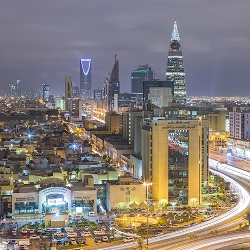Saudi Arabia Planning Its Own Version of Las Vegas

Just a few years ago, anyone suggesting that an entertainment resort similar to Las Vegas could be built in the center of Saudi Arabia would have been met with derision. Still, that is exactly what is being planned, with its opening date in the capital city of Riyadh scheduled for the year 2030.
Once fully completed, the resort will cover up to 334 square miles of Saudi Arabian land, meaning that one-fifth of the size of Riyadh itself will be dedicated to the project, rivaling the size of its Las Vegas counterpart. Amongst the many attraction that will be offered in the entertainment city will be sporting amenities, and entertainment venues, including a safari park, and a Six Flags Park featuring thrill rides and other family attractions. Commenting upon the project, Prince Salman stated:
“This city will become, by God’s will, a prominent cultural landmark and an important centre for meeting the future generation’s recreational, cultural and social needs in the kingdom.”
Traditional Society
Saudi Arabia has a major Sunni Islam community that could easily view the proposed multi-billion dollar entertainment district as going against their religion. That is just one of the pressing questions that is going to have to be discussed ahead of the first stage of the hub’s opening in 2022, with initial work getting underway in early 2018.
One of the big issues that the project is going to have to address is the segregation of men and women in Saudi Arabian society. As theme parks are generally aimed mostly at children, any entertainment hub that includes both genders is likely to be viewed as revolutionary by members of the more orthodox members of the community. This issue is in addition to all the other restrictions that Islamic law places upon their society. Therefore, the complex will have to take all this into consideration while adhering to all the strict guidelines that are laid out by the country’s religion and society.
Alcohol and cinema are also both banned in Saudi Arabia, further limiting the resort’s appeal to an international audience, while women are further required to be dressed in loose fitting robes, potentially dissuading even more women from certain attractions. There is, however, a grass root movement in the country to change some of its draconian restrictions and start offering more liberal entertainments, like those offered to people living in places such as London and New York. As Ahmed Al Khatib, chairman of the General Entertainment Authority (GEA), referring to the under 30 year old population, explains:
“I believe we are winning the argument. [A few Saudis are liberal, a few conservative, but] the majority are moderate. They travel, they go to cinemas, they go to concerts. I am counting on the middle segment, which is about 80 per cent of the population.”
A Change of Views
It is likely that the complex will be forced to alter society’s view of liberal entertainment in order to encourage the citizens of Saudi Arabia to visit. This is especially true because not everyone in the country is Sunni. One way of doing this may be by placing an emphasis on the country’s popular sports, such as football, sailing, windsurfing, scuba diving, camel and horse racing.
Saudi Arabia attracts around 15 million tourists every year, and it is estimated that around 5 million of these them are there for religious reasons, not least to take part in a pilgrimage to Mecca. That does mean, though, that 10 million tourists are there for non-religious reasons, which could help generate the revenue needed to make the resort a success. While the first part of the project’s opening is still at least five years away, watching how this ambitious project unfolds over the next few years will be of great interest to the entertainment industry.
One activity that is highly unlikely to take place at the resort will be gambling, though, as the practice in all its forms is forbidden by the country’s strict Islamic law. That said, gambling is illegal in Russia and China, except inside government sanctioned jurisdictions, and so the possibility of some such allowance being made in Saudi Arabia may not be quite as ridiculous as it first appears.










